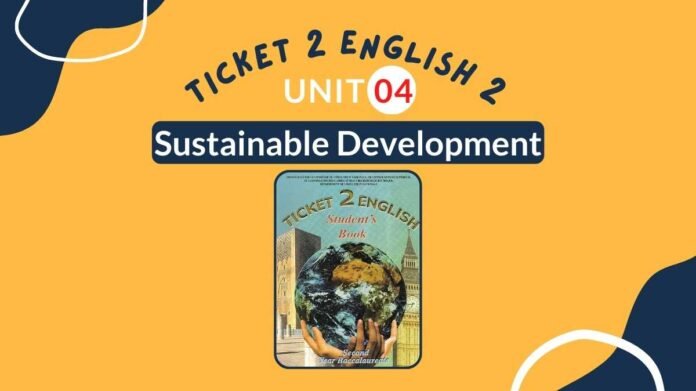This is a quick summary of “Ticket 2 English Unit 4 Sustainable Development.” It covers vocabulary, functions, grammar, and writing to help you understand this unit better and score high in your exams.
- Vocabulary
- Functions: Expressing Cause and Effect
- Grammar: The Future Perfect
- Writing: Formal Letter
Vocabulary Ticket 2 English Unit 4
According to Wikipedia:
Sustainable development is a roadmap, an action plan, for achieving sustainability in any activity that uses resources and where immediate and intergenerational replication is demanded. As such, sustainable development is the organizing principle for sustaining the finite resources necessary to provide for the needs of future generations of life on the planet. It is a process that envisions a desirable future state for human societies in which living conditions and resource use continue to meet human needs without undermining the “integrity, stability, and beauty” of natural biotic systems.
Sustainable development consists of the following:
Social issues :
- Health care / social justice
- Poverty elimination
- Property rights / equal pay for women
Economic issues :
- Raw materials
- Climate change
- Microenterprise
- Transport infrastructure
Environment issues:
- Climate change /ecological crisis
- Water pollution/forest preservation
- Recycling waste/energy preservation
Collocations
A collocation is a pair of words that generally goes or occurs together. Here are some that are related to sustainable development :
- Civil society
- Non-governmental organization
- Sustainable development
- Renewable energy
- Urban areas
- Social Justice
- Green areas
- Developed countries
- Developing countries
- Under-developed countries
- Developing countries
- Developed countries
- Environmental sustainability
- Economic sustainability
- Social sustainability
- Climate change
- Carbon emissions
- Biodiversity
- Water conservation
- Waste reduction
- Green infrastructure
- Sustainable transportation
- Eco-friendly products
- Carbon footprint
- Natural resources
- Sustainable agriculture
- Green technology
- Climate action
Functions: Expressing Cause and Effect
Cause (x)
- Because of/due to/owing to/thanks to………….(x)…….., ………………(y)…………
- …(y)… is/are caused by /due to …..(x)…….
- Since/Because ………(x)………., …………..(y)……………………
- As………(x)………., …………..(y)……………………
- The cause of …(y)…. is…(x)……
- On account of …(x)…, …(y)…
- As a result of …(x)…, …(y)…
- In view of …(x)…, …(y)…
- Seeing that …(x)…, …(y)…
- Due to the fact that …(x)…, …(y)…
- Given that …(x)…, …(y)…
- For the reason that …(x)…, …(y)…
- Owing to the fact that …(x)…, …(y)…
- Thanks to the fact that …(x)…, …(y)…
- Based on …(x)…, …(y)…
- In light of …(x)…, …(y)…
- Considering that …(x)…, …(y)…
- Because of the fact that …(x)…, …(y)…
- If it weren’t for …(x)…, …(y)…
Note:
Due to/Because of/Owing to/Thanks to + Gerund/Noun
Because/since/as + Subject + Verb
Effect (y)
- ……(x)…….Consequently………(y)……..
- …..(x)……..For this reason, ……(y)……..
- …..(x)…..That’s why……..(y)…………
- ……(x)…….. As a result,………(y)……
- ….…(x……As a consequence, ………(y)……
- ….…(x)…………So ………(y)……….
- ….…(x)……..thus ………(y)………
- The result/effect/consequence of…..…(x)….… is………(y)……..
- With the result that …(y)…, …(x)…
- Accordingly, …(y)…, …(x)…
- …(x)…; therefore, …(y)…
- …(x)…. Hence …(y)…
- …(x)…; consequently …(y)…
- …(x)…; this led to …(y)…
- …(x)…; this caused …(y)…
- The outcome of …(x)… is …(y)…
- The consequence of …(x)… is …(y)…
- The effect of …(x)… is …(y)…
Examples :
- The cause of her excellent grades is her hard work.
- Her good grades are due to her hard work.
- The result of her hard work is her good grades.
- She worked hard; as a result, she had good grades.
- The students were late for class, and for this reason, they were punished.
- Owing to the fact that the bridge was under repair, we had to take a detour.
- Considering that the traffic is usually heavy at this time, I will leave early to avoid getting stuck in traffic.
- Seeing that it was getting late, we decided to leave the party early.
- We didn’t have the necessary equipment; that’s why we were unable to complete the project on time.
- We didn’t have enough time to prepare for the meeting; for this reason, we decided to reschedule it.
Grammar: The Future Perfect
1- Form of the future perfect:
[will have + verb (past participle )]
2- Examples of the future perfect
Affirmative
- By the end of next year, I will have completed my degree.
- In five years, they will have saved up enough money for a down payment on a house.
- By the time we arrive, the party will have already started.
- In three months, she will have finished writing her book.
- By the end of the week, he will have run 50 miles.
- You will have finished your school year by the end of July.
Interrogative
- Will You have finished your school year by the end of July?
- Can you tell me if you will have completed your degree by the end of next year?
- Will they have saved up enough money for a down payment on a house in five years?
- Will the party have already started by the time we arrive?
- Will she have finished writing her book in three months?
- Will you have run 50 miles by the end of the week?
Negative
- You will not have finished your school year by the end of July
- By next year, I will not have finished my degree.
- By next year, I will not have finished my degree yet.
- The company will not have completed the project by the deadline.
- They will not have saved enough money for their trip by the end of the month.
- By the time she retires, she will not have traveled to all the countries on her list.
- I will not have learned how to play the piano by the end of the semester.
2- The use of the future perfect
The Future Perfect is a tense that expresses the idea that something will occur before another action. It can also show that something will happen before a specific time. It is generally used with expressions like by, by then, by that time, by the 24th, and by 2070…
Writing: Formal Letter
Formal letter
An official letter (also called formal) is a letter you write to someone you look up to, and it can be the school’s principal, your teacher, a manager, etc. The layout must be respected.
Click on the image below for this lesson: How do You Write a Formal Letter?





thank you mr.Nabil
thank you my teacher nabil
My pleasure Amine
Dear sir,
I recently saw your English high school lessons on your website and they really grabbed my attention because they are such helpfull handouts for teachers to work with. However, the only obstacle that i found is that i couldn’t download the 2bac lessons to help me since i give some extra hours to this level students. I hope that you can help.
I am looking forward your reply sir.
Your sincerely,
Bilal El Khabch
tanks teacher #Nabil
thank you
good job …thaaanks
Excellent post. I was checking continuously this blog and
I’m impressed! Extremely helpful info specifically the remaining phase :
) I maintain such info a lot. I was looking for this particular info for a long time.
Thanks and best of luck.